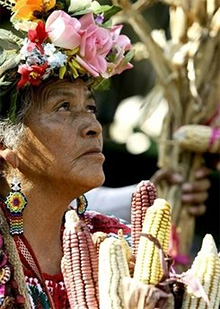
|  |  |  News Around the Republic of Mexico | October 2009 News Around the Republic of Mexico | October 2009  
Tests on Treasured Maize Ignite Fears in Mexico
 Sophie Nicholson – Agence France-Presse Sophie Nicholson – Agence France-Presse
go to original
October 30, 2009


| | A Mexican farmer takes part in a protest in Mexico City in January 2009. As scientists race the clock to increase food production worldwide, new trials to plant genetically-modified maize have stoked anger in Mexico, the cradle of corn. (AFP/Ronaldo Schemidt) |  |
Mexico City – As scientists race the clock to increase food production worldwide, new trials to plant genetically-modified maize have stoked anger in Mexico, the cradle of corn.

Many here are sensitive about meddling with maize, which dates back to pre-Hispanic times, when mythologies held that people were created from corn.

Some fear Mexico could one day lose the wealth of native varieties it still produces, including red and blue, to a few, tough breeds of GM maize, as well the livelihoods of hundreds of thousands of subsistence farmers.

The government this month granted its first 22 permits to agribusinesses Monsanto, Dow AgroSciences and Pioneer to carry out tests on GM maize on farms in north and west Mexico.

Mexico is the number one producer of white maize, which is used to make its famous flat tortillas, but it imports increasing amounts of yellow maize from the United States, mainly for cattle feed.

The tests are part of efforts to help the country return to maize self-sufficiency and keep food prices down.

The price of maize has more than doubled since 2007, which prompted tens of thousands to protest the price of tortillas in Mexico last year.

"No country should be dependent for its food from other countries," Ariel Alvarez Morales, head of the Bi-Secretarial Commission on Biosecurity of Genetically-Modified Organisms, told AFP.

"We can take advantage of this biodiversity we have in maize, and part of that can also be through this (GM) technology," Morales said.

The United States, China and India are among countries that already grow GM crops, while six European countries have banned them.

GM crops, also including soya and cotton, are highly controversial, with critics underlining potential risks to health and the environment.

Greenpeace has led efforts to protect Mexico's maize after GM traces have turned up in samples of native varieties in the past decade, despite a moratorium on planting GM maize.

The new test permits cover more than 10 hectares (25 acres) in northern border states and the western top corn-producer of Sinaloa, and the government has pledged to prevent them from contaminating native varieties.

But Greenpeace claims they risk polluting 31 of more than 50 native seeds and is filing court motions to withdraw the permits.

"The final goal is not to experiment. It's to open the door for these kind of crops which only benefit the companies, not the producers nor Mexican consumers," Greenpeace campaigner Aleira Lara told AFP.

The government should spend more money helping small farmers and protecting native corn, Lara said.

Of the country's 1.9 million corn farmers, some 85 percent have less than five hectares (12.5 acres) of land, according to government figures.

As the GM debate rages on, much of Mexico's treasured maize diversity is for now protected in a giant seed bank in central Mexico, which keeps tiny grains of different colors and sizes at freezing temperatures, holding 27,000 maize samples from across the Americas.

"It's a repository of potentially useful genes for future breeding and response to problems ... for example in response to climate change," said maize expert Kevin Pixley, at the International Maize and Wheat Improvement Center (CIMMYT) in Texcoco, where the bank lies among fields of maize.

Scientists also cross-breed grains and advise on more efficient farming techniques to help them survive challenges, such as this summer's severe drought.

They say that, in the current climate, Mexican farmers need all the help they can get.

"If conserving diversity in the field actually conserves poverty of the farmers by having them grow varieties that are far inferior to those that are available, then I think it's a debatable issue," Pixley said.
|

 |
|  |



